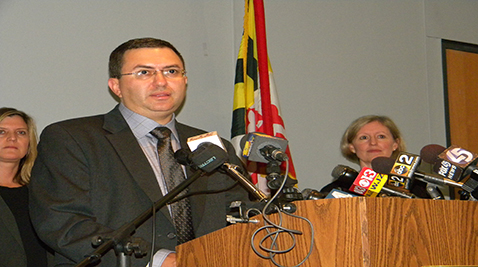The Maryland Health Department announces their plan for Ebola prevention. Video by Alanna Delfino.
BALTIMORE — Maryland is prepared to deal with the possibility of an Ebola infection, said Department of Health and Mental Hygiene Secretary Dr. Joshua Sharfstein at a Thursday press conference, following the news earlier this week that a man in Texas is the first confirmed case of the deadly disease in the United States.
“The people in Maryland should know there is a lot of preparation going on,” Sharfstein said. “We have a health care system that is fully able to identify and respond to a whole range of potential issues, including Ebola virus.”

While Maryland has not yet had a diagnosed case of Ebola, health officials say it’s “certainly possible.”
Dr. Anthony Harris, a University of Maryland professor of epidemiology and public health, said there is a “reasonable possibility” that in the next year a hospital in Maryland will have a patient who has traveled from West Africa and has Ebola.
“Unfortunately, yes,” Harris said. “But I think the big difference though is that we are fully prepared to deal with that patient from the minute that they set foot in the door.”
Earlier this week, a man in Dallas, who traveled from Liberia and entered the country through Dulles International Airport, was confirmed as the first Ebola case ever in the U.S. The man is being treated in a Dallas area hospital.
Since Ebola is only spread through direct contact with the bodily fluids of someone who is infected, Sharfstein said, “the general population is not at risk for Ebola at this point.” If you’re not someone who has traveled recently from West Africa, there is really nothing to worry about, he said.
Additionally, health officials said people who were on flights at Dulles at the same time as the now-confirmed Ebola patient are really not at any risk based on current evidence.
Sharfstein, along with a host of other health officials at the press conference, said preparing for Ebola is similar to preparing for other infectious diseases, and assured the public that disease surveillance and rapid testing standards and protocols are in place.
Officials are working to get out guidance to health care providers across the state on what to look for when it comes to Ebola and what to do if they think someone might have the disease, said Dr. Lisa Maragakis, director of the Department of Epidemiology and Infection Control at Johns Hopkins Hospital.
Additionally, labs are required to report all suspected cases of Ebola, and the state lab in Baltimore actually has the ability to test for the Ebola virus, making Maryland only one of 13 states with this capability, officials said.
Officials also assured there are procedures in place among hospitals, health care providers and emergency response agencies for safe removal and isolation of a patient if a case is ever confirmed. For instance, D.H.M.H. and local health departments have a 24-7 system that can investigate a possible Ebola case and deploy, among other things, protocols and treatment recommendations, said Dr. Richard Alcorta, acting co-executive director of the Maryland Institute for Emergency Medical Services Systems.
Officials said they have even taken the additional step of having inter-disciplinary meetings over the last several months with hospitals and healthcare providers to get their input on the Ebola situation, and to keep them abreast on the screening protocols and procedures.
Finally, officials said, they are working in collaboration with the Centers for Disease Control and Prevention and other states on how to respond if there is an outbreak.
The Ebola outbreak in West Africa has killed more than 3,000 people since it began six months ago, according to the World Health Organization. The epidemic began in Guinea, but has since spread to Liberia, Sierra Leone and Nigeria. The W.H.O has also reported that Senegal has had a travel-associated case of the Ebola virus.


You must be logged in to post a comment.